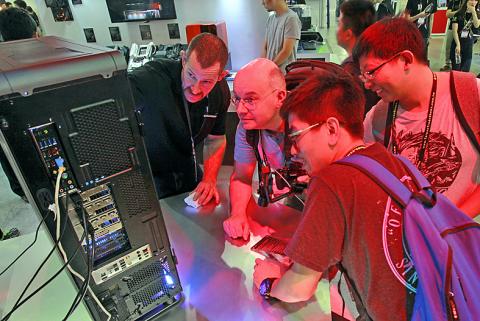Taipei Computer Association chairman Tung Tzu-hsien (童子賢) yesterday called for a better investment environment and a more open-minded attitude in response to the government’s plan to build an “Asian Silicon Valley” for start-ups and firms producing innovative products.
“It might not work if the government simply wants to copy the success of Silicon Valley,” Tung told a forum focusing on start-ups at Computex Taipei.
Tung’s remarks came after President Tsai Ing-wen (蔡英文) told the opening ceremony of Computex that the government is to carry out an “Asian Silicon Valley” initiative in Taoyuan, connecting domestic and international resources in manufacturing and research and development in a bid to develop Internet of Things (IOT) supply chains.

Photo: Chiang Ying-ying, AP
Silicon Valley represents not only a location, but an adventurous spirit of innovation and creation, despite the failures of numerous start-ups over the decades, Tung said at the forum.
He said the government is thinking from a perspective of manufacturing hardware, but it is also important to think about deregulating to improve the investment environment, such as easing the regulations that allow foreigners to take white-collar jobs in Taiwan.
It is equally important that society has an open-minded attitude to encouraging start-ups, regardless of nationality or gender, he said.

Photo: Chiang Ying-ying, AP
“Many of the important international enterprises in Silicon Valley were not founded by Americans,” Tung said.
He said that Taiwan has adequate funds and talent for new start-ups, but he is not certain if society is tolerant enough to support foreign start-ups.
If the government’s start-ups initiative is only for Taiwanese firms, then such a mind-set would not help Taiwan to achieve its goal of becoming an Asian innovation hub, he said.
Tung said he has also noticed that society has overly emphasized the difficulties that start-ups might face in the early stages of their development.
“Our education system needs to change. We should encourage the younger generation to think outside of the box, be adventurous and not afraid of failure,” Tung said.
Crowdfunding company Backer-Founder (貝殼放大) chief executive Tahan Lin (林大涵) said he thinks it is not necessary to build an “Asian Silicon Valley” in Taiwan, as it is more important to help investors cooperate with start-ups.
What start-up companies need is investors who understand their vision and their added-value, rather than having a location like an industrial park in northern Taiwan, Lin said.
InnoVEX, an exhibition featuring 217 start-ups from 22 nations, is taking place at Taipei World Trade Center Exhibition Hall 3, along with Computex Taipei.
Organizers the Taiwan External Trade Development Council (TAITRA) and the Taipei Computer Association said five main fields — hardware and the Internet of Things; B2B software; cloud applications; consumer technology; and health technology — are being displayed by both local and foreign start-ups at the venue from yesterday until tomorrow.

Taiwanese suppliers to Taiwan Semiconductor Manufacturing Co. (TSMC, 台積電) are expected to follow the contract chipmaker’s step to invest in the US, but their relocation may be seven to eight years away, Minister of Economic Affairs J.W. Kuo (郭智輝) said yesterday. When asked by opposition Chinese Nationalist Party (KMT) Legislator Niu Hsu-ting (牛煦庭) in the legislature about growing concerns that TSMC’s huge investments in the US will prompt its suppliers to follow suit, Kuo said based on the chipmaker’s current limited production volume, it is unlikely to lead its supply chain to go there for now. “Unless TSMC completes its planned six

Intel Corp has named Tasha Chuang (莊蓓瑜) to lead Intel Taiwan in a bid to reinforce relations between the company and its Taiwanese partners. The appointment of Chuang as general manager for Intel Taiwan takes effect on Thursday, the firm said in a statement yesterday. Chuang is to lead her team in Taiwan to pursue product development and sales growth in an effort to reinforce the company’s ties with its partners and clients, Intel said. Chuang was previously in charge of managing Intel’s ties with leading Taiwanese PC brand Asustek Computer Inc (華碩), which included helping Asustek strengthen its global businesses, the company

Power supply and electronic components maker Delta Electronics Inc (台達電) yesterday said second-quarter revenue is expected to surpass the first quarter, which rose 30 percent year-on-year to NT$118.92 billion (US$3.71 billion). Revenue this quarter is likely to grow, as US clients have front-loaded orders ahead of US President Donald Trump’s planned tariffs on Taiwanese goods, Delta chairman Ping Cheng (鄭平) said at an earnings conference in Taipei, referring to the 90-day pause in tariff implementation Trump announced on April 9. While situations in the third and fourth quarters remain unclear, “We will not halt our long-term deployments and do not plan to

The New Taiwan dollar and Taiwanese stocks surged on signs that trade tensions between the world’s top two economies might start easing and as US tech earnings boosted the outlook of the nation’s semiconductor exports. The NT dollar strengthened as much as 3.8 percent versus the US dollar to 30.815, the biggest intraday gain since January 2011, closing at NT$31.064. The benchmark TAIEX jumped 2.73 percent to outperform the region’s equity gauges. Outlook for global trade improved after China said it is assessing possible trade talks with the US, providing a boost for the nation’s currency and shares. As the NT dollar